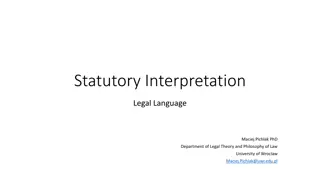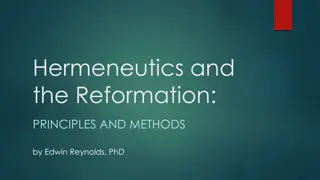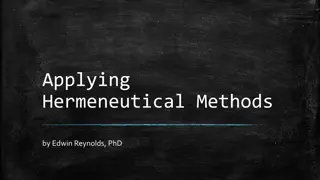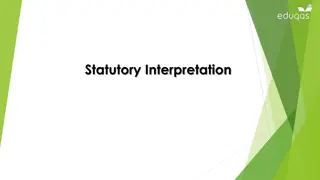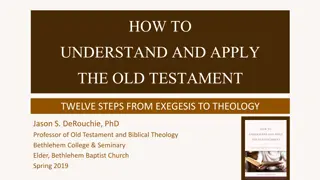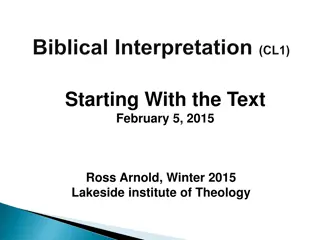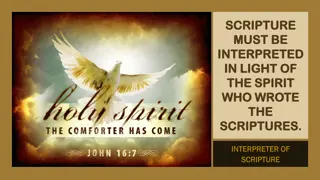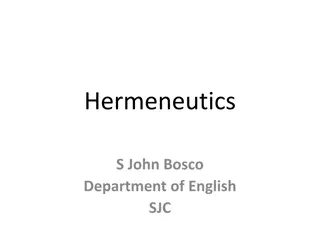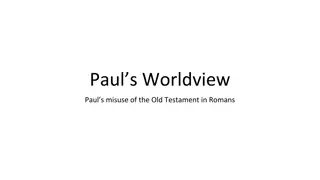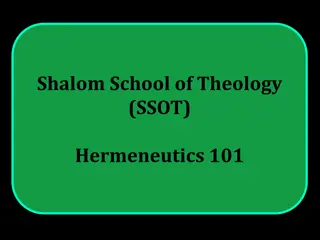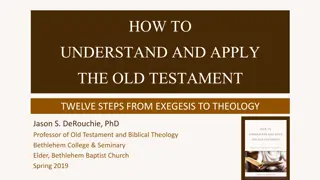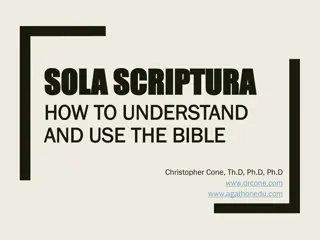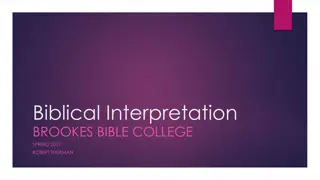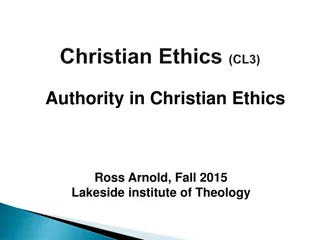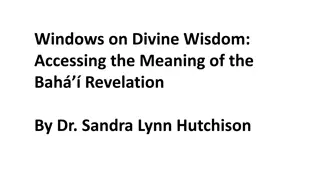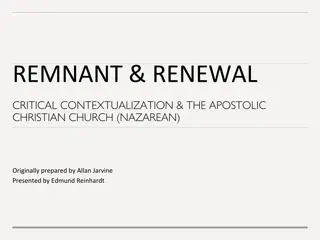Understanding Exegesis and Hermeneutics in Origen's Interpretation of Scripture
Origen, a prominent early Christian theologian, delved into various types of exegesis to interpret scripture, including textual analysis, allegory, and moral teachings. His insights on the literal and spiritual understanding of scripture, along with his views on martyrdom and the restoration of all things, offer a unique perspective on biblical interpretation.
Download Presentation

Please find below an Image/Link to download the presentation.
The content on the website is provided AS IS for your information and personal use only. It may not be sold, licensed, or shared on other websites without obtaining consent from the author. Download presentation by click this link. If you encounter any issues during the download, it is possible that the publisher has removed the file from their server.
E N D
Presentation Transcript
Lecture 10: Origen 3 October 2019 Origen 1
Introduction Some Points in Exhortation to Martyrdom Types of exegesis How to Understand Scripture Literal and Spiritual understanding Antiochene vs. Alexandrian schools Introduction to On First Principles Early Spirituality Application in Commentary on Song of Songs 2 Origen
Exhortation to Martyrdom God referred to as The One Like his contemporary Plotinus, founder of pagan neoPlatonism Vague references to getting soul back (XII) Origen speculated on apokatastasis, or restoration of all things at end of time in God Speculated on eternity of souls; Seemed to believe in the cooling of souls from heaven God jealous like a bridegroom (IX) References to his father and children of martyrs (XI, XXXVIII) 3 Origen
Exegesis, Criticism and Hermeneutics Exegesis from Greek, , explanation, full narrative What does the text say Criticism, from Greek, to judge Often relates to analysis of writer, what s written, and/or the audience (historical, literary, audience criticism) Hermeneutics from Greek god Hermes, who interpreted the messages of the gods What does the text mean Note that as used in contemporary Biblical analysis, these words tend to be very fluid I will use exegesis and hermeneutics synonymously; What the text says is what it means This is how the Fathers viewed the text But what does the text say? For Church Fathers, the Bible is ONE BOOK 4 Origen
Types of Exegesis Textual Analysis of texts, comparisons of multiple versions of same text Effort to determine which is the real text; Origen s Hexapla Literal Sense CCC 116 Text as literally true; historically accurate; Irenaeus Spiritual Sense CCC 117 Allegorical or typological: OT prefigures or is a type of Christ (we read the OT this way almost every Sunday) Moral: Scripture teaches how to follow The Way Anagogical: Scripture leads us to our proper end Spiritual: admits multiple levels of meaning (hermeneutics) 5 Origen
Typology and Allegory (Both Spiritual Senses) Almost all Christians who accept the OT (whether in antiquity or now) use typology to understand the OT Makes connection between OT and NT Irenaeus and Tertullian Fundamentalist Christians Allegory goes beyond typology Use signs and symbolism to make connections between OT and philosophy Philo, Clement, Origen Catholics, Orthodox 6 Origen
Origen and Textual Analysis Tried to determine the correct text of the OT Issue: multiple Greek and Hebrew versions in use by different Christian and Jewish communities Origen consulted with Jewish school in Ceasarea Origen s school most famous Christian school of his time Developed Hexapla (now lost) Six versions of Greek OT Compared with Hebrew Greatest textual critic of antiquity; St. Jerome in the West being a close second. Jerome seems to have used Origen s Hexapla to translate the OT into Latin (Vulgate) 7 Origen
Origen and Literal Exegesis Reason for Origen s extensive textual work was to determine what was the correct literal sense Origen believed that the literal sense was the starting place for understanding Scripture 8 Origen
Origen and Typology Origen read the OT as leading to Jesus Christ; preparing the way for God s people to accept Jesus Could not understand Jesus without properly understanding the OT Example: the sacrifice of Isaac. In his Commentary on Genesis, Origen describes Isaac as a precursor to Christ, Abraham as the Father There was a lively exchange of exegetical analysis between Origen and rabbis in Caesarea NB: From the earliest Christian Fathers, we refer to the story as the Sacrifice of Isaac, even though he was not actually killed. In counterpoint, earliest rabbis called it the binding of Isaac 9 Origen
Origen and Allegory Need allegorical interpretation to resolve seeming contradictions in Scripture Need allegory to resolve philosophical understanding of God (God is one, God is good, God is eternal) with some Scriptural descriptions of God, especially in the OT Allegory can reveal multiple levels of meanings Attaching symbolic meanings to numbers, names, colors, etc. Example: six days of Creation Problem: how to make sure that allegory does not become fanciful and false (gnostics) Basis of Lectio Divina 10 Origen
Antiochene Exegesis Name given to a group of 4th Century theologians who were concerned about the extent of Alexandrian allegory Concerned especially about more fanciful Christological interpretations Key figures: Diodorus, Theodore of Mopsuestia, John Chrysostom, Theodoret Note that even though these exegetes focused on literal and typological, they also used theoria to find moral lessons in Scripture 11 Origen
Background On First Principles Often referred to as the first systematic work Background to refute Marcion and Valentinus, and as an apology But also a theological investigation Most of original Greek is lost; preserved in Latin translated by Rufinus (4th C) 12 Origen
Structure of On First Principles Written in Four Books Preface sets out the Rule of Faith Book I Studies three realities: Trinity, rational creatures, world Books II and III Detailed discussions the Rule of Faith Book IV Reconsideration of Book I - III 13 Origen
Structure Book IV Divine origin of Scripture; Scripture tells the truth about God, His Son, the Holy Spirit and the relation of Trinity to world Importance of prophecy Proper way to understand Scripture; Importance of apostolic succession Some parts of OT can only be understood spiritually Examples in Chapter III 14 Origen
Structure Book IV (cont.) Relation between Father and Son; Understanding what Origen meant caused much grief in the next century: Arian controversy There was when he was not 4.1 What does John 1:1-2 and Prov. 8:22-31 say? What do they mean? But he also uses homoousia Material, created world is always changing Man in his rationality is like God; this is eternal Pre-existence of souls? 15 Origen
The Idea of Spiritual Progress Emphasis on how to follow the Way of Jesus Development of approaches to spirituality Biblically based, usually with a highly allegorical interpretation Intended to be accessible to everyone, Frequently the basis for Patristic homilies Well defined steps in approach to spiritual life 16 Origen
Types of Spirituality Both types include purgation, illumination and unity stages Spiritual masters suggested steps for both ways Apophatic (via negativa) Move toward God away from creation; God as transcendent; what God is not Discourages use of senses; Emotions suppressed Heart is only satisfied with God Bridal mysticism Example: Going into the desert (Monasticism) Kataphatic (via positiva) Approaching God through creation; incarnation and passion of Jesus; what God is Encourages use of senses; Emotions are excited God has a history in the world Service mysticism Example: Pilgrimages 17 Origen
Major Elements to Spiritual Progress Three Stages Purgation Illumination Unity In different authors, there may be several steps within each stage Origen (and many others, including Gregory of Nyssa, rabbis, Bernard of Clairvaux) Commentary on Song of Songs Proverbs first stage (purgation) Ecclesiastes second stage (illumination) Song of Songs third stage (unity) 18 Origen
Origens Legacy Hugely influential on Cappadocians: St. Basil, St. Gregory Nazianzus, St. Gregory of Nyssa (St. Ambrose) St. Gregory Thaumaturgus student of Origen Philokalia Hugely influential on theological developments in Alexandria St. Athanasius, homoousia Spiritual impact on Evagrius of Pontus In fourth century Theological and political rivalries between Constantinople and Alexandria is phrased as those for and against Origen 19 Origen
20 Origen
Assignments Read Book IV On First Principles; especially Chapters 1, 2, 4 Read Commentary on Song of Songs CCC 101-119 Benedict XVI, General Audience 25 April 2007, Origen, Life and Work http://www.vatican.va/holy_father/benedict_xvi/audiences/2007/d ocuments/hf_ben-xvi_aud_20070425_en.html Benedict XVI, General Audience 2 May 2007, Origen and His Thought http://www.vatican.va/holy_father/benedict_xvi/audiences/2007/d ocuments/hf_ben-xvi_aud_20070502_en.html Write short paper on Origen 21 Origen



